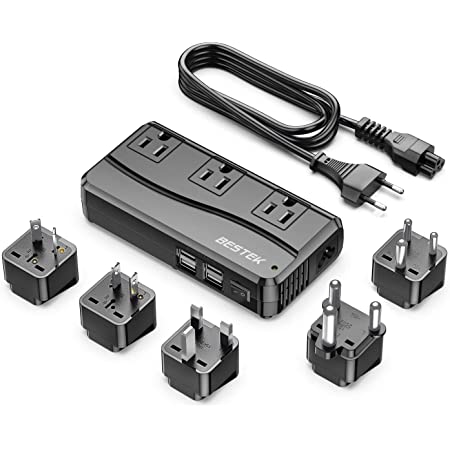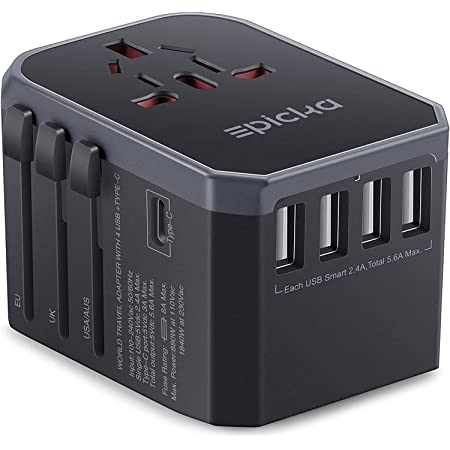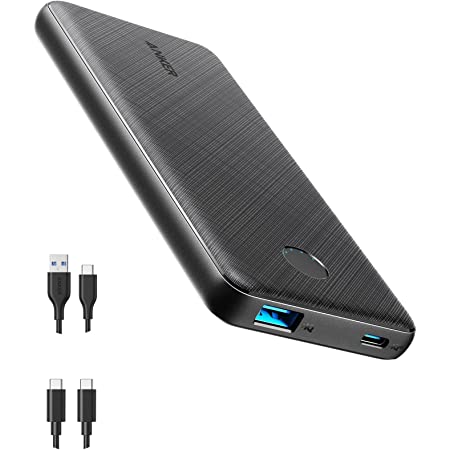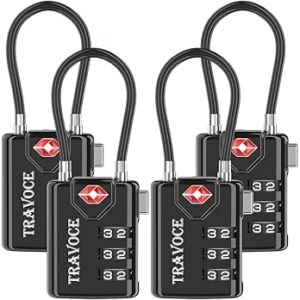Plug For Brazil: What You Need To Know
What is the plug for Brazil? Before you travel, check the information below to make sure your electronic devices are compatible with the outlet type and voltage.
Electrical Summary
Brazil uses outlet types C, N at a voltage of 127/220V and a frequency of 60 Hz.
Plug Compatibility: Type C, Type N
Voltage: 127/220V
Frequency: 60 Hz
Type C

Type N

Can North Americans use Electronics in Brazil without an Adapter?
No! North Americans will need an adapter for the outlets when traveling to Brazil. North Americans device plugs will not work with the outlet types in Brazil. Also, transformers are recommended due to the different voltages available in Brazil.
Can Europeans use Electronics in Brazil without an adapter?
Yes! Most Europeans do not need a travel adapter when traveling to Brazil. Most device plugs will work with the outlet types in Brazil. However, transformers are recommended due to the different voltages available in Brazil.
What Outlet does Brazil Use?
Type C

Type C plug sockets are used in Europe, Africa and Asia. They have two round pins and no grounding pin. These plugs are typically used with devices that have a voltage of 220-240V. This outlet is rated for 2.5 amps. Plug Type E, and Type F are compatible with this socket. All other plug types will need an adapter.
Type N

Type N plug sockets are used in Brazil. They have three round pins, similar to type C plug sockets but with a different arrangement. These plugs are typically used with devices that have a voltage of 110-240V.
Recommended Products:
Should I use a VPN when traveling?
YES! Using a VPN when traveling is highly recommended to protect your online privacy and security. Public Wi-Fi networks in hotels, airports, and cafés are often unsecured, making you vulnerable to hackers and data theft. A VPN encrypts your internet connection, safeguarding sensitive information like passwords and banking details. It also allows you to bypass geo-restrictions, granting access to streaming services and websites that may be blocked in certain countries. Additionally, a VPN helps prevent government surveillance and ISP tracking. For a seamless and secure browsing experience while traveling, choose a reliable VPN with fast speeds and strong encryption.
Brazil Travel Essentials:
Is it safe to drink water in Brazil?
To be on the safe side, you can use common precautions such as boiling tap water for at least one minute, using water purification tablets, or drinking bottled water. It’s also important to note that ice may be made from tap water and that foods may be washed or prepared with tap water.
We recommend always packing a filtered water bottle when traveling!
Travel Essentials
Be sure to check our list of travel essentials before your trip!
Should I get travel insurance when traveling to Brazil?
It is generally recommended to get travel insurance when traveling to a different country. Travel insurance can provide financial protection and peace of mind in case of unexpected events, such as medical emergencies, trip cancellations, lost or stolen baggage, or other travel-related mishaps.
Travel insurance can cover various expenses related to your trip, such as medical expenses, emergency medical transportation, trip cancellation or interruption, lost or stolen baggage or personal belongings, and other travel-related expenses.
Before purchasing travel insurance, it’s important to carefully review the policy details, including the coverage limits, exclusions, and any applicable deductibles or copays. You should also make sure that the policy covers any activities or destinations that you plan to participate in or visit during your trip. Click here to price Travel Insurance for Brazil
Frequent Questions
Where is Brazil located?
Brazil is located in South America and is the largest country on the continent. It is bordered by every South American country except Chile and Ecuador, and has a vast Atlantic Ocean coastline to the east. Brazil is known for its diverse landscapes, including the Amazon Rainforest, the Pantanal wetlands, and beautiful tropical beaches.
What is the capital of Brazil?
The capital of Brazil is Brasília, a planned city that was officially inaugurated in 1960. Designed by architect Oscar Niemeyer, Brasília is known for its modernist architecture and organized layout. It serves as the political and administrative center of the country, housing the federal government and key national institutions.
What language is spoken in Brazil?
The official language of Brazil is Portuguese. It is the only Portuguese-speaking country in South America, making its language and culture unique in the region. While English is taught in schools and spoken in tourist areas, fluency is limited outside major cities, so basic Portuguese phrases can be helpful for travelers. Grab a Portuguese phrasebook for your trip.
What currency is used in Brazil?
Brazil uses the Brazilian Real (BRL, R$) as its official currency. Credit and debit cards are widely accepted in most cities and tourist destinations, but carrying cash is recommended for use in rural areas or small businesses. ATMs are available nationwide, and mobile payments are increasingly popular. Get great rates on currency transfers with Wise
What is Brazil known for?
Brazil is known for its vibrant culture, passionate football (soccer) fans, and stunning natural wonders. The country is famous for the Amazon Rainforest, Rio de Janeiro’s Christ the Redeemer statue, Copacabana and Ipanema beaches, the Carnival festival, samba music, and the Iguazu Falls on the border with Argentina.
Is Brazil a safe country to visit?
Brazil is a popular travel destination, but safety can vary by region. While many areas are safe for tourists, especially those that are well-traveled and monitored, others may have higher crime rates. Travelers are advised to stay alert, avoid isolated areas at night, and follow local advice to stay safe.
What is the weather like in Brazil?
Brazil has a diverse climate due to its size, ranging from tropical in the north to temperate in the south. The Amazon region is hot and humid year-round, while the coastal areas are warm with a wet and dry season. Southern Brazil experiences cooler winters and hot summers, especially in cities like São Paulo and Porto Alegre.
What are the best places to visit in Brazil?
Top places to visit in Brazil include Rio de Janeiro for its beaches, nightlife, and landmarks; São Paulo for culture and cuisine; and Salvador for Afro-Brazilian heritage and colonial architecture. Nature lovers should explore the Amazon Rainforest, Pantanal wetlands, and Iguazu Falls, while Florianópolis and Fernando de Noronha offer stunning beach escapes.
What food is Brazil known for?
Brazilian cuisine is rich and diverse, influenced by indigenous, African, and European traditions. Popular dishes include feijoada (a black bean and pork stew), pão de queijo (cheese bread), moqueca (seafood stew), and churrasco (Brazilian barbecue). Açaí bowls and tropical fruits are also commonly enjoyed throughout the country.
How expensive is Brazil to visit?
Brazil can be an affordable destination depending on the region and travel style. Major cities like Rio and São Paulo can be more expensive, especially during events like Carnival. However, local food, public transport, and accommodations outside major tourist hubs are budget-friendly, making Brazil accessible to a wide range of travelers.
Travel Summary
One of the most popular tourist destinations in Brazil is Rio de Janeiro, a city famous for its Carnival celebration, beautiful beaches like Copacabana and Ipanema, and iconic landmarks such as the Christ the Redeemer statue and Sugarloaf Mountain. Visitors can also enjoy the city’s lively nightlife and delicious cuisine, which includes traditional dishes like feijoada (a bean stew) and churrasco (Brazilian barbecue).
Another must-see destination in Brazil is the Amazon rainforest, which covers over 60% of the country’s land area. Visitors can explore the rainforest on guided tours, spotting wildlife like monkeys, toucans, and jaguars, and learning about the diverse indigenous cultures that call the Amazon home.
Other popular destinations in Brazil include Salvador, a city known for its Afro-Brazilian culture and stunning colonial architecture; Florianopolis, an island paradise with over 40 beaches to explore; and Foz do Iguaçu, home to the breathtaking Iguaçu Falls, which are taller than Niagara Falls.
In addition to its natural beauty and cultural attractions, Brazil is also home to a vibrant arts scene, with world-renowned artists and musicians like Gilberto Gil and Tom Jobim hailing from the country. Visitors can experience Brazil’s rich artistic heritage at museums and galleries throughout the country.
Overall, Brazil offers a rich and diverse travel experience, with something to suit every interest and budget. Whether you’re looking for adventure in the rainforest, relaxation on the beach, or a taste of Brazil’s vibrant culture and cuisine, this dynamic country has it all.
Traveling to another country? Check out our Countries page for more info on countries like Colombia, Venezuela, Guyana, Suriname, French Guiana, Uruguay, Paraguay, Bolivia, Argentina, Peru





